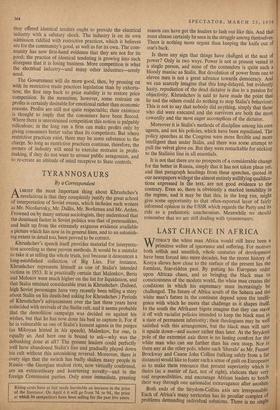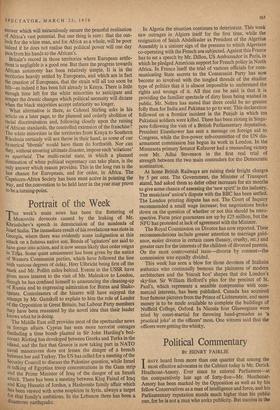LAST CHANCE IN AFRICA W ITHOUT the white man Africa would
still have been a primitive welter of ignorance and suffering. For motives both selfish and unselfish, whole centuries of development have been forced into mere decades, but the recent history of Kenya shows how close to the surface of the present lies the formless, fear-ridden past. By putting his European order upon African chaos, and so bringing the black man to consciousness of the modern 'world. the white man creates the conditions in which his supremacy must increasingly be challenged. The future of Africa south of the Sahara and the white man's future in the continent depend upon the intelli- gence with which he meets that challenge as it shapes itself. In the south the Afrikaner bigots imagine that they can stave it off with racialist policies intended to keep the black man in a state of permanent inferiority; their theologians may be well satisfied with this arrangement, but the black man will turn it upside down—and sooner rather than later. At the Strydorn pole of the extremist axis there is no lasting comfort for the white man who can see farther than his own stoep. Nor is there any at the other pole, where such 'liberals' as Mr. Fenner Brockway and Canon John Collins (talking safely from a far distance) would like to foster such a sense of guilt on Europeans as to make them renounce that present superiority which is theirs (as a matter of fact, not of right), abdicate their very real responsibilities, and encourage African leaders to botch their way through one nationalist extravagance after another.
Both ends of the Strydom-Collins axis are irresponsible. Each of Africa's many territories has its peculiar complex of problems demanding individual solutions. There is no single answer which will miraculously ensure the peaceful realisation of Africa's vast potential. But one thing is sure: that the out- look for the white man, and for Africa as a whole, will be poor Indeed if he does not realise that political power will one day pass from his hands to the African's.
Britain's record in those territories where European settle- ment is negligible is a good one. But there the progress towards African autonomy has been relatively simple. It is in the territories heavily settled by Europeans, and which are in fact the creation of Europeans, that the strain will all too soon be felt—as indeed it has been felt already in Kenya. There is little enough time left for the white minorities to anticipate and temper the drastic changes which political necessity will dictate when the black majorities accept inferiority no longer.
What alternative is there, as Colonel Stirling asks in his article on a later page, to the planned and orderly abolition of racial discrimination and, following closely upon the raising of African standards, the controlled extension of the franchise? The white minorities in the territories from Kenya to Southern Rhodesia certainly will not throw in their hand, as some of our hysterical 'liberals' would have them do forthwith. Nor can they, without ensuring ultimate disaster, impose such 'solutions' as apartheid. The multi-racial state, in which a planned diminution of white political supremacy can take place, is the only answer which reason provides. This in the long run is the last chance for Europeans, and for order, in Africa. The Capricorn-Africa Society has been most active in pointing the way, and the, convention to be held later in the year may prove to be a turning-point.



































 Previous page
Previous page